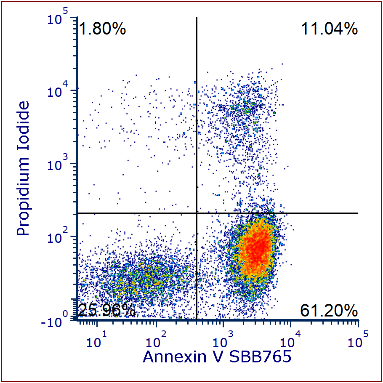Bio-Rad Laboratories, Inc., a global leader in life science research and clinical diagnostics products, today announced the launch of annexin V conjugated to eight StarBright Dyes: SBUV400, SBUV795, SBV440, SBV515, SBV790, SBB675, SBB765, SBY800. The new Annexin V StarBright conjugates support the detection of early apoptotic cells by flow cytometry, offering an increased range of fluorophore options.
 Annexin V StarBright™ Conjugates. Image Credit: Bio-Rad Laboratories
Annexin V StarBright™ Conjugates. Image Credit: Bio-Rad Laboratories
Bio-Rad’s range of annexin V conjugates provides researchers with a variety of choices, especially important when including apoptosis detection in multicolor immunophenotyping panels in both conventional and full spectrum flow cytometry.
Annexin V StarBright conjugates enable full utilization of all the common laser lines found in flow cytometers such that common viability dye and fluorescent protein emission wavelengths can be avoided. This, combined with the narrow excitation and emission of StarBright Dyes, reduces spillover and spreading to provide high-resolution data.
Introduction of Annexin V StarBright Dye conjugates offers customers greater choice and flexibility when detecting apoptosis in both conventional and full spectrum flow cytometry. Bio-Rad has one of the most comprehensive ranges of annexin V conjugates, allowing users to follow best practice and accurately detect apoptosis with minimum spillover with their viability dyes.”
Hilary Mavor, Marketing Director, Life Science Group at Bio-Rad Laboratories